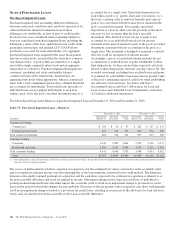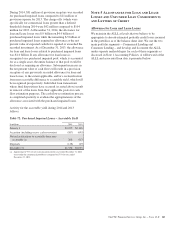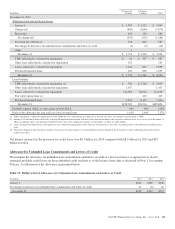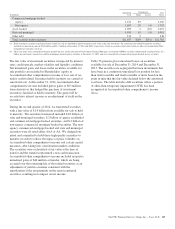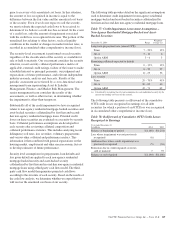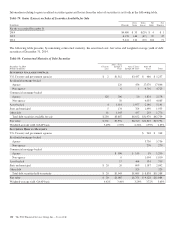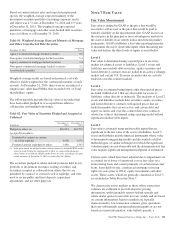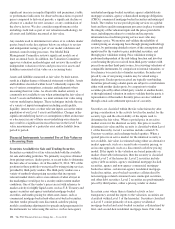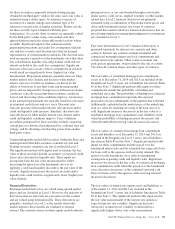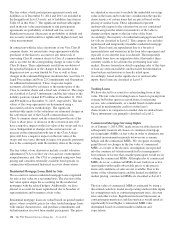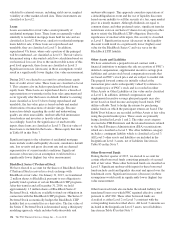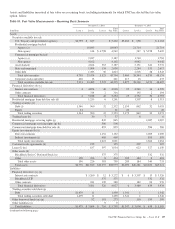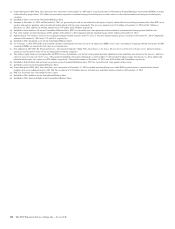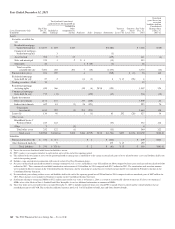PNC Bank 2014 Annual Report Download - page 169
Download and view the complete annual report
Please find page 169 of the 2014 PNC Bank annual report below. You can navigate through the pages in the report by either clicking on the pages listed below, or by using the keyword search tool below to find specific information within the annual report.
Based on current interest rates and expected prepayment
speeds, the weighted-average expected maturity of the
investment securities portfolio (excluding corporate stocks
and other) was 4.3 years at December 31, 2014 and 4.9 years
at December 31, 2013. The weighted-average expected
maturities of mortgage and other asset-backed debt securities
were as follows as of December 31, 2014:
Table 81: Weighted-Average Expected Maturity of Mortgage
and Other Asset-Backed Debt Securities
December 31, 2014 Years
Agency residential mortgage-backed securities 3.6
Non-agency residential mortgage-backed securities 5.4
Agency commercial mortgage-backed securities 3.4
Non-agency commercial mortgage-backed securities 3.2
Asset-backed securities 3.4
Weighted-average yields are based on historical cost with
effective yields weighted for the contractual maturity of each
security. At December 31, 2014, there were no securities of a
single issuer, other than FNMA, that exceeded 10% of Total
shareholders’ equity.
The following table presents the fair value of securities that
have been either pledged to or accepted from others to
collateralize outstanding borrowings.
Table 82: Fair Value of Securities Pledged and Accepted as
Collateral
In millions
December 31
2014
December 31
2013
Pledged to others (a) $10,874 $12,572
Accepted from others:
Permitted by contract or custom
to sell or repledge 1,658 1,571
Permitted amount repledged to others 1,488 1,343
(a) In the prior period, the pledged to others balance incorrectly included FHLB standby
letters of credit. During the fourth quarter of 2014, we corrected the pledged to
others balance to exclude the FHLB standby letters of credit. Accordingly, the prior
period amount as of December 31, 2013 was reduced by $6.2 billion.
The securities pledged to others include positions held in our
portfolio of investment securities, trading securities, and
securities accepted as collateral from others that we are
permitted by contract or custom to sell or repledge, and were
used to secure public and trust deposits, repurchase
agreements, and for other purposes.
N
OTE
7F
AIR
V
ALUE
Fair Value Measurement
Fair value is defined in GAAP as the price that would be
received to sell an asset or the price that would be paid to
transfer a liability on the measurement date. GAAP focuses on
the exit price in the principal or most advantageous market for
the asset or liability in an orderly transaction between market
participants. GAAP establishes a fair value reporting hierarchy
to maximize the use of observable inputs when measuring fair
value and defines the three levels of inputs as noted below.
Level 1
Fair value is determined using a quoted price in an active
market for identical assets or liabilities. Level 1 assets and
liabilities may include debt securities, equity securities and
listed derivative contracts that are traded in an active exchange
market and certain U.S. Treasury securities that are actively
traded in over-the-counter markets.
Level 2
Fair value is estimated using inputs other than quoted prices
included within Level 1 that are observable for assets or
liabilities, either directly or indirectly. The majority of Level 2
assets and liabilities include debt securities, equity securities
and listed derivative contracts with quoted prices that are
traded in markets that are not active, and certain debt and
equity securities and over-the-counter derivative contracts
whose fair value is determined using a pricing model without
significant unobservable inputs.
Level 3
Fair value is estimated using unobservable inputs that are
significant to the fair value of the assets or liabilities. Level 3
assets and liabilities include financial instruments whose value
is determined using pricing models and discounted cash flow
methodologies, or similar techniques for which the significant
valuation inputs are not observable and the determination of fair
value requires significant management judgment or estimation.
Certain assets which have been adjusted due to impairment are
accounted for at lower of amortized cost or fair value on a
nonrecurring basis and consist primarily of certain nonaccrual
loans, loans held for sale, commercial mortgage servicing
rights (in years prior to 2014), equity investments and other
assets. These assets, which are generally classified as Level 3,
are included in Table 86 in this Note 7.
We characterize active markets as those where transaction
volumes are sufficient to provide objective pricing
information, with reasonably narrow bid/ask spreads and
where dealer quotes received do not vary widely and are based
on current information. Inactive markets are typically
characterized by low transaction volumes, price quotations
that vary substantially among market participants or are not
based on current information, wide bid/ask spreads, a
The PNC Financial Services Group, Inc. – Form 10-K 151



